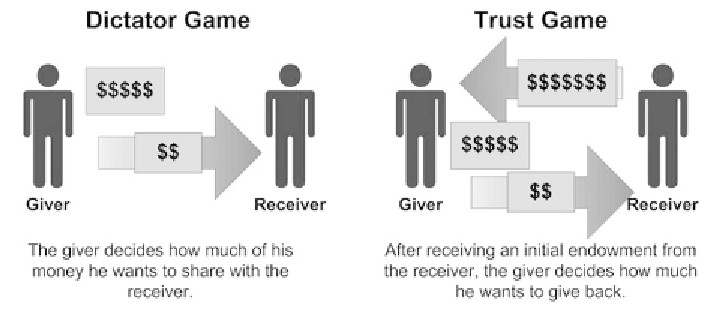Game Development Reference
In-Depth Information
Certainly, this could be related to the structure of the game and the testing
environment. If some dude in a lab coat were to hand me $100 and say “Could you
share some of this with a stranger, please?�? I wouldn't have too much of a problem
with it. I'm still walking out with more money than I came in with. However, if you
were to approach me and say “Take some of your
own
assets and share them now,�?
you would likely get a slightly more rude answer.
T
RUST
G
AME
One final twist on these sorts of games is a spin on the Dictator Game. We need to
reset the names again, as we are now getting a little circular. Once again, we have a
Giver who will bestow an amount on the Receiver. However, in a sort of mirror
twist, the amount the Giver has to split is based on an initial gift by the eventual
Receiver (Figure 5.8).
FIGURE 5.8
The difference between the Dictator Game and the Trust Game
is that in the Trust Game, the Receiver gives a sum of money to the
Giver in the hopes of getting some of it back.
At first glance, it would seem silly for the Receiver to give the Giver anything at
all in the hope of getting it back. Therefore, to prime the pump, the pot is generally
sweetened somewhat by the researchers through matching funds or some other en-
ticement, so that the Receiver is encouraged to actually give
something
to the Giver.
Yes, it's twisted.
The reason that this is interesting is that, once in possession of the funds, the
Giver doesn't
have to
give anything (back) to the Receiver. Just like the Dictator
Game, to maximize his own portion, it is in the Giver's best interest to
not
give any-
thing to the Receiver, and yet the Givers still tend to do so. Perhaps it is altruism again.
Yet, once again, altruism is not possible to track via strictly mathematical models.

